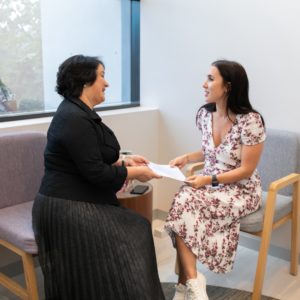Analysis and testing are the first steps in determining what fertility treatments you might need. One in six Australian couples experience difficulties conceiving, so if you have been trying to conceive for some time, know that you are not alone.
If you have been trying to conceive for 12 months and you are under 35 (or six months if you are over 35), it’s a good time to seek advice from your GP or book an appointment with a fertility specialist. Dr Raewyn is one of the world’s leading fertility specialists and has helped many couples overcome fertility issues and go on to conceive healthy, happy babies.
Analysis and testing for men
Conceiving a healthy baby depends on a number of factors, including healthy sperm. While a woman’s age is the biggest factor affecting the chance to conceive, male infertility is the second biggest issue.
Male factor infertility affects around half of all infertile couples, but the good news is that the most common causes of male infertility are easily diagnosed, and most are treatable. It is also more cost-effective to test the male first. If no underlying issues are found, we can then look into testing the female.
The first and most important fertility test for men is a semen analysis, which measures the number of sperm, motility and morphology in a sample.
Other issues we can treat and methods we can utilise when dealing with male infertility include:
- Vasectomy reversal
- Digital high magnification of sperm(enlarging images of sperm to select the most appropriate sperm to be injected into the egg)
- Intracytoplasmic Sperm Injection (ICSI)where a single sperm is injected into each egg to assist fertilisation.
Understanding fertility in women
There are a few different issues that can affect female fertility, with the biggest factor being a woman’s age. Dr Raewyn can assess your overall reproductive health and conduct some simple tests to identify any other underlying causes of pregnancy delay.
For women, fertility tests typically include blood tests and ultrasounds to check for a range of different issues, including:
We can also check your ovulation, ovarian reserve – which refers to the pool of eggs left in your ovaries with reproductive potential – and other specific fertility conditions. Additional tests may also be needed to check your fallopian tubes and condition of the uterus.



